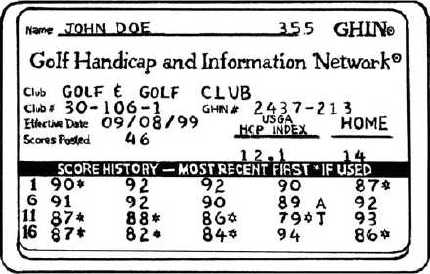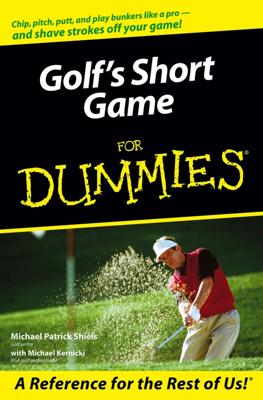Scoring is another great thing about golf. You can easily see how you're doing because your score is in black and white on the scorecard. Every course you play has a scorecard. The scorecard tells you each hole's length, its par, and its rating relative to the other holes (see Figure 1).
 |
Figure 1: Keeping score. |
Stroke play and match play have slightly different rules. For example, in stroke play, you must count every shot you hit and then record the number on the card. In match play, you don't have to write down any score. The only thing that matters is the state of the game between you and your opponent.
Stroke play
Stroke play is strictly card-and-pencil stuff. You are playing against everyone else in the field, not just your playing companion. All you do is count one stroke each time you swing at the ball. If it takes you five strokes to play the first hole, you write 5 on your card for that hole.
You don't record your own score, though. The card in your pocket has your playing companion's name on it. You keep his score, and he keeps yours. At the end of the round, he signs his name to your card and gives it to you; you do the same with his card. After you have checked your score for each hole, you also sign your card.
Then, if you're in an official tournament, you hand your card to the scorers. If you're playing a casual round, you record your score on the computer.
Take care when checking your card. One rule quirk is that you are responsible for the accuracy of the score recorded under your name for each hole — your companion isn't. Any mistakes are deemed to have been made by you, not him. And you can't change a mistake later, even if you have witnesses.
Take the case of Roberto DeVicenzo at the 1968 Masters. Millions of spectators and TV viewers saw him make a birdie three on the 17th hole in the final round. But the man marking his card, Tommy Aaron, mistakenly marked a 4. Checking his score after the round, DeVicenzo didn't notice the error and signed his card. The mistake cost DeVicenzo the chance of victory in a playoff with Bob Goalby. DeVicenzo had to accept a score one higher than he actually shot and lost by that one stroke. Tragic.
DeVicenzo's mistake illustrates what can happen when the score on your card is higher than the one you actually made on the hole. You're simply stuck with that score. If the opposite is the case and the score on the card is lower than it should be, you're disqualified.
One last thing: Don't worry about the addition on your card. You are not responsible for that part. As long as the numbers opposite each hole are correct, you're in the clear.
Match play
In match play, the score is recorded as holes up or holes down. For example, say Bob's score on the first hole was four, and Tom's score was five. Bob is now "one up." Because each hole is a separate entity, you don't need to write down your actual score; you simply count the number of holes you've won or lost.
In fact, if you're having a particularly bad time on a given hole, you can even pick up your ball and concede the hole. All you lose is that hole. Everything starts fresh on the next tee. Such a head-to-head match is over when one player is more holes up than the number of holes remaining.
Thus, matches can be won by scores of "four and three." All that means is that one player was four holes ahead with only three left, the match finishing on the 15th green.
Don't get too wrapped up in how many shots you're taking to play a round, at least at first. For many golfers, the score doesn't mean that much anyway. They oftentimes play a match against another player or team, so the only thing that matters is how they compare with their opponents.
But that's a totally different game from the one that you see the pros playing on TV every week. For them, every shot is vital — the difference between making the cut or not, or finishing in or out of the big money. That's why the pro game is better left to the pros.

